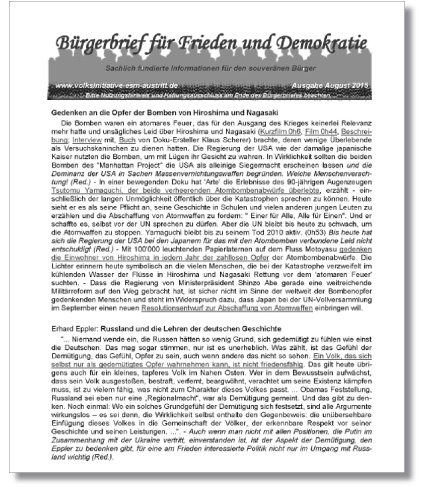Citizens’ letter for peace and democracy
cc. Print media, websites and initiatives are a dime a dozen. There is no chance to have an overview of what is recommendable and what should rather be critically reviewed. In the following article the editors of the German “Bürgerbrief für Frieden und Demokratie” (Citizens’ letter for peace and democracy) introduce their website and their concern. They commit themselves to peaceful conflict solutions in international
relations, for a more balanced economic and financial regulation and for more direct democracy in Germany.
By using digital information services, many interested citizens want to gather information about the world events and their background. There are also difficulties connected with that endeavour. Often the sources are impossible to verify. Often it takes a lot of time, until one comes across things that are interesting and important. Sometimes one sits in front of the PC for hours, with only a low yield.
Each information service focuses on certain priorities and interests, filtering out information with this focus. Often it is commented according to the respective political opinion, sometimes quite polemically. It frequently happens that you are connected to blogs, where polemic disputes are posted. All these are the citizens’ democratic rights. Nevertheless one would like to obtain interesting information, that is missing in the mainstream media with less personal effort
information that one must not filter out of some polemical blog dialogues.
The editorial team of the “Bürgerbrief für Frieden und Demokratie”, therefore has set itself the task to filter a part of the daily data flood and make it available to the readers. Of course, there is no claim for completeness, and here as well information is filtered according to certain objectives as regards content: Just according to what we believe is important in order to preserve and develop peace and democracy. What democratically active citizens are already doing to achieve these objectives seems important to us as well. With this in view, we are indeed impartial and independent, but not indifferent.
In the following we try to disclose and put into words our political and ethical attitude: A lifely democracy is the best way to attain the overarching goal of peaceful coexistence of people and nations. We understand democracy as the equal participation of all citizens’ in public life and in the decisions to be taken. This is more than just choosing one’s representatives. We believe, that the citizens are able to do more. We do not share the repeatedly expressed
opinion, holding that the rather important decisions should be left to the “experts” at higher levels.
Vibrant democracy relies on sovereignty, i.e. on freedom of decision at all levels, beginning with the individual citizen via the federal authorities up to the national level. We support the principle of subsidiarity to the effect that from the municipality up to the international level, as much as possible should be decided at the respective lower level and that only factually overarching issues should be decided at the next higher level; that applies to fiscal issues, as well.
In this sense, we are very sceptical about any centralism even in the 21st century. It is an opponent to civic sovereignty. However, we increasingly encounter centralism in supposedly democratic robe everywhere, both in the international economic and financial world as well as – most of all – at the supranational level of the EU. For quite some time our representatives in Germany, but also in other EU countries, have become henchmen for strong lobbies from which today’s increasing militarization and warfare emanates. And this is where things have come full circle: The European Union, once propagandistically launched as a peace project, practices the undermining of democratic institutions, of division of powers, of sovereignty and, indeed, of a genuine peace policy that respects the sovereignty of
other nations as self-evidently as it respects the human rights of each citizen. Against this centralism and against the disregard of human rights and national sovereignty, we want to strengthen and encourage the free citizen. Especially, we would like to strengthen direct democratic options which were once promised in the German “Grundgesetz”(Basic Law Art. 20, 2) but not implemented in practice. In recent years lots of citizens have recollected on their sovereignty, that is on their freedom, and have developed activities referring to the formation of a common political will and to the expression of opinion beyond the professionalized political business. We want to report on these efforts and possibly even contribute to networking.
The “Bürgerbrief für Frieden und Demokratie” have emanated from the popular initiative for the withdrawal from the ESM that has collected signatures for Germany’s withdrawal from the European Stability Mechanism since 2013. In order to help our fellow citizens to form their own opinion the editorial team of this newsletter to citizens collects current and basic information and opinions on the topics: rights and dignity of man, war and peace, self-determination and sovereignty, active citizenship, democracy, subsidiarity and division of powers, human economies, meaningful European cooperation, relations with international institutions. If we find interesting articles and news in the digital world, they are briefly summarized and linked and only sometimes briefly commented. In addition, we also want to inform about the activities of other citizens and thus support the possibility that these active citizens gain knowledge of each other and, if they wish, also communicate with each other. Since May 2014 the newsletter has been published monthly with currently two to three, sometimes four pages. You can find it on the website <link http: www.volksinitiative-esm-austritt.de>www.volksinitiative-esm-austritt.de directly on the homepage. If a subscription is activated on this page, the newsletter will be delivered by email after being published. The editorial team is pleased if readers of the newsletter in turn take the opportunity of proposing articles. •
(Translation Current Concerns)
